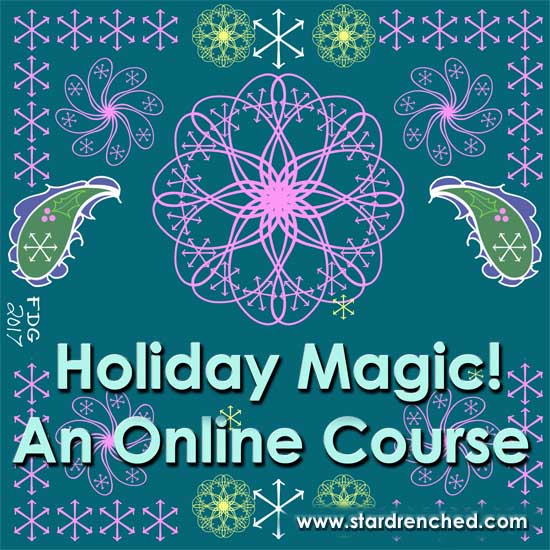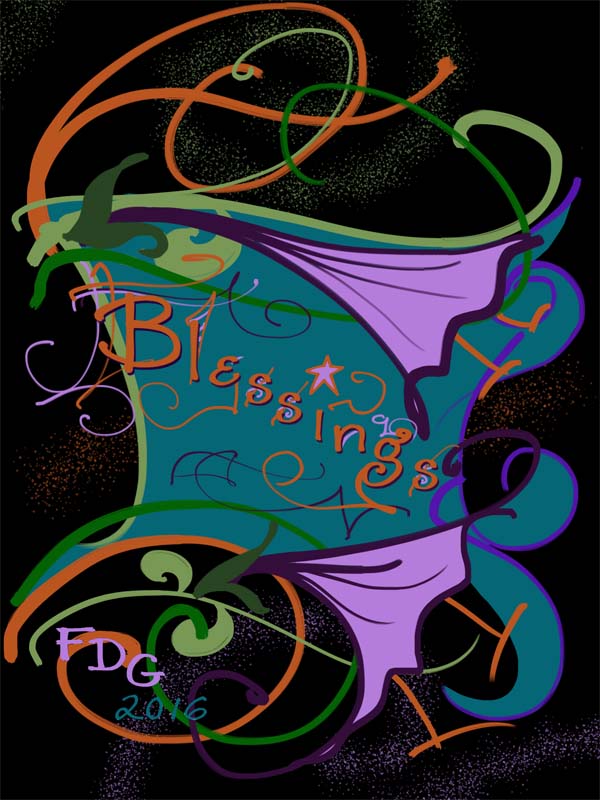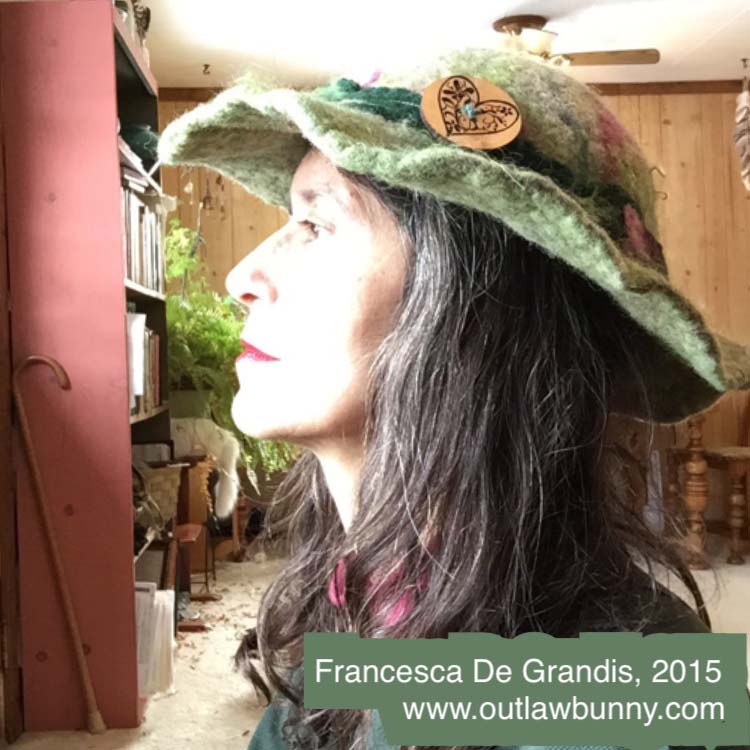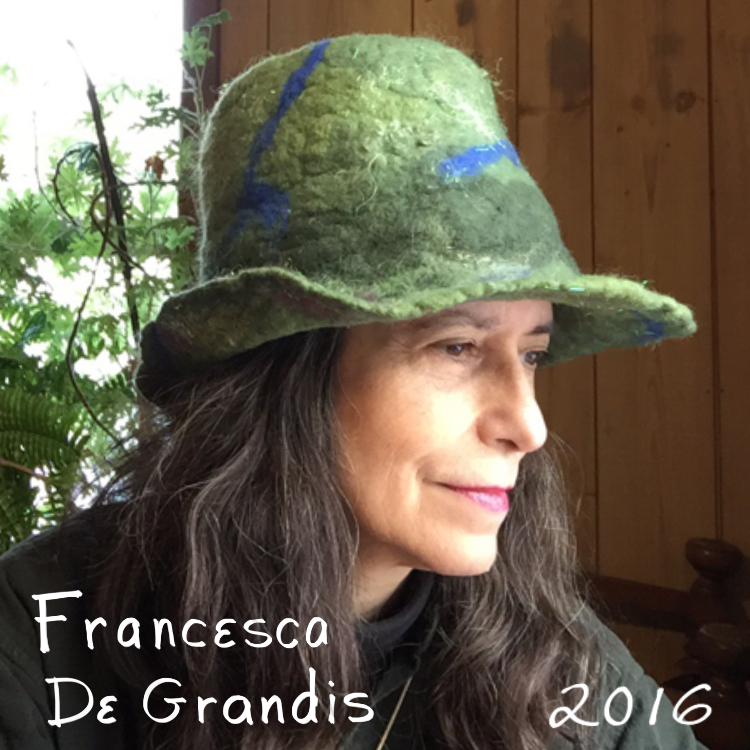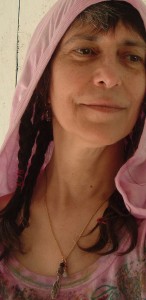Enjoy the holidays, Pagan style. Make your season happy, abundant, safe, sacred, sane, and magical. This course has five powerful aspects:
 One) Weekly lessons, delivered to you by email. Each lesson is a digital Book of Shadows entry (PDF), ornamented by my seasonal shamanic art, which makes the Book of Shadows a cherished tradition in the years ahead.
One) Weekly lessons, delivered to you by email. Each lesson is a digital Book of Shadows entry (PDF), ornamented by my seasonal shamanic art, which makes the Book of Shadows a cherished tradition in the years ahead.
I boiled lessons down to their essence, so they tend to be easy and accessible. They include:
* simple quick spells, prayers, and affirmations, to nourish, energize, and inspire you during the holidays.
* fun holiday crafts and decorations, Pagan-style. Use common household items to make enchanted seasonal decor: charms for just about anything you might wish. Children enjoy these crafts. Also, discover how typical American holiday decorations can be used in spells.
* Special rituals. We’ll experience the Winter Goddess’ sacred realm. Center into wholeness and joy. Enjoy the season’s spiritual beauty. Rites include a star-drenched Faerie Solstice celebration.
* Lots of material to choose from. Pick what you want to use this year and enjoy the rest for many years to come. The course includes powerful Fey-touched material I’d not published previously.
During your busy holiday season, there’s no need to waste time searching online for fun or meaningful activities. This course delivers them to you.
Enjoy unique magics not available elsewhere.
 Two) Magical decor: eight digital full-color amulets—my original Pagan art—for harmony, success, and more. Print and cut out to hang on your Yule tree or elsewhere in your home. Four of the amulets’ designs are suitable to display all four seasons, for yearlong blessings.
Two) Magical decor: eight digital full-color amulets—my original Pagan art—for harmony, success, and more. Print and cut out to hang on your Yule tree or elsewhere in your home. Four of the amulets’ designs are suitable to display all four seasons, for yearlong blessings.
 Three) Six audio recordings made especially for this course. Hearing spoken word can be enchanting, and a way you and I can be in sacred space together. So I recite excerpts of the weekly lessons. One recording will be part of the Yule ritual.
Three) Six audio recordings made especially for this course. Hearing spoken word can be enchanting, and a way you and I can be in sacred space together. So I recite excerpts of the weekly lessons. One recording will be part of the Yule ritual.
Receiving gorgeous PDFs, relaxing to enchanted recordings, and printing amulets are a satisfying, productive use of the digital world, instead of overdosing on social media and online shopping.
 Four) I’m available by phone for up to 45 minutes. If you have questions about the material, need support because your commitment to the lessons falters, want to further explore a particularly tantalizing part of the curriculum, or have other concerns, feel free to phone.
Four) I’m available by phone for up to 45 minutes. If you have questions about the material, need support because your commitment to the lessons falters, want to further explore a particularly tantalizing part of the curriculum, or have other concerns, feel free to phone.
You can divide the 45 minutes into two or three conversations. Conversations must occur during the span of the course or within a month after.
 Five) Exclusive gift: I’ll give you a five-day direct spiritual transmission during Solstice week at no extra cost! Free! The price would have been $150. This Yule blessing heals inner blocks that sabotage your happiness, spiritually rejuvenates you, and centers you into what’s important to you. These benefits can last for months if not years.
Five) Exclusive gift: I’ll give you a five-day direct spiritual transmission during Solstice week at no extra cost! Free! The price would have been $150. This Yule blessing heals inner blocks that sabotage your happiness, spiritually rejuvenates you, and centers you into what’s important to you. These benefits can last for months if not years.
 November is a turning point in the Pagan calendar. The course starts November 5, with your first lesson. You receive one lesson a week by email for 11 weeks. That will bring us halfway into January.
November is a turning point in the Pagan calendar. The course starts November 5, with your first lesson. You receive one lesson a week by email for 11 weeks. That will bring us halfway into January.
Post-Solstice lessons provide spells for a great 2024. You also learn how to work with mystical energies that occur in the weeks immediately after Solstice. Years ago, I noticed those energies and spent goodly hours developing related shamanic modalities for significant self-empowerment. Most of the post-Solstice material has remained unpublished till now.
If an unexpected event makes me unable to send one week’s planned material, I’ll extend the course an extra week.
Tuition: The regular price is $209 a month for three months, but I’ve lowered the cost to $167 a month. That is 20% off!
Scroll down to pay securely with PayPal:
No experience needed. However, even advanced practitioners will enjoy this. If you need more information, or want to discuss scholarship, trade, or a special payment plan, call the phone number below. No refunds. My online courses aren’t transcriptions of oral tradition lessons. I teach oral tradition by phone. The online courses are special unto themselves—magic tailored to be spectacularly useful, exciting, effective, and safe when learned online.
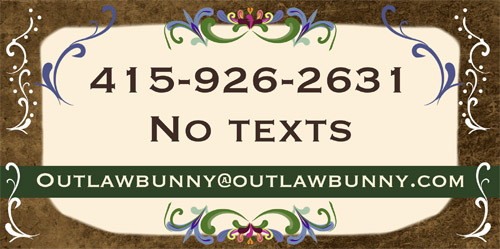
Lessons are substantive without being overwhelming. You are brought gently and deeply into star-drenched Mysteries that heal, empower, and uplift.
Lessons also help us find joy. Joy is not an extravagance but more important than ever. Even when it is tiny, or we’re striving for it unsuccessfully, it wraps us in the Gods’ love for us. This helps Them protect, heal, and strengthen us. And They become more able to bring us abundance and other material blessings. Embrace Their gifts. Enroll now.

